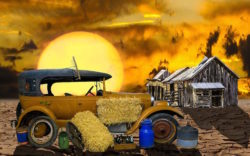Crises can bring out the worst in us, but also the best. They lay bare the sickness and rot of our society, which we may not see or experience ourselves, and make the lives of those already suffering worse.
The coronavirus pandemic is showing the worst in us as basic necessities like soap and food are hoarded and scalped for profit. Many promote the dubious argument that stockpiling is simply the result of an innate, biological force of self-preservation; some go so far as to pathologize it as a “disorder.” However, most will not entertain the idea that it is, in fact, a natural response to living within a capitalist system that encourages individualism at all costs—a system that so deeply and effectively atomizes and divorces us from ourselves, our neighbors, our communities, nature, and the most marginalized that we internalize the very market forces that oppress us in the first place, forcing us to become fearful and lash out at others. In this sense, we devolve from homo sapiens to homo economicus. Given this economic backdrop, there should be less blame placed on those who buy out of fear than on the structures of power that facilitate and encourage such behavior.
The crisis also highlights the best in us. Drawing from our innate, biological instincts to help one another, people are building upon existing mutual aid networks and organizing new ones, from food shares to crowdsourced social solidarity, showing that the molding of our genes and selves by the state and market can be resisted through solidarity.
Like “solidarity,” the phrase “mutual aid” is losing its meaning. It is being stolen and misused by opportunistic politicians, self-appointed community leaders and market forces. And, also like solidarity, mutual aid is not something you say; it’s something you do. Mutual aid is a practice, a way of living, being, and doing. It is people giving what they can and getting what they need.
The COVID-19 crisis—and the failure of the state and market to address it—shows us that there are other ways of living, other ways of being and other ways of relating to one another. It provides us an opportunity to strengthen and organize community projects that concurrently function as counter-institutions, forms of protest, social welfare and organization. Just as crises can broadly expose the rot and poison of our society and institutions, they can reveal the possibilities of a society that looks and operates much differently.
While the Earth has a moment to breathe, we have an opportunity to practice (and reflect upon) mutual aid with those most negatively affected by COVID-19. These actions may cause us to question why things are the way they are, to see root causes, to see what may happen when we start to see the worst of the climate crisis and ecological collapse, to see that there are alternatives to the state and market, and to see that we must not only be reactive, but proactive. We can subvert disaster capitalism with disaster collectivism.
Through mutual aid, we also have the opportunity to question what community means, and what it means to organize it. Is it viewing the world as a battlefield where short-term, top-down “fights,” “battles,” and “wins,” suffice for social change? Is it exerting our limited time and collective energy electing politicians that ultimately turn their backs on us? Or, is it viewing the world as a commons where organizing is seen as a long-term effort from the bottom-up, outside of failing institutions?
If we are to weather the storm of neofascism, ecofascism, climate crisis, ecological collapse and COVID-19—which very well could get worse—we have to find a place within the shelters of community. The shelters of community we repair, build, and organize should be constructed as long-lasting structures against problems, so that resilience is a term that is rarely uttered. In order to find ourselves again, we must find one another again. Our current crisis is a moment that can be seized, a crack that can be widened, a seed that can be planted. It gives us a view into what a just future can look like when everything around us falls apart. Start where you are, where others are, and go from there.
Like what you just read? Support Flagpole by making a donation today. Every dollar you give helps fund our ongoing mission to provide Athens with quality, independent journalism.







